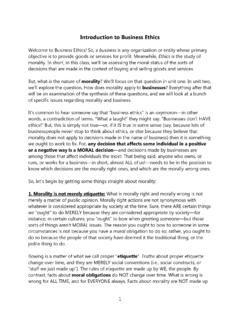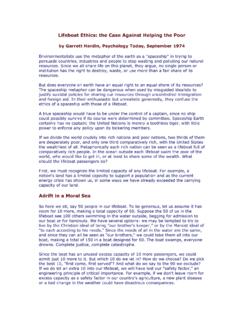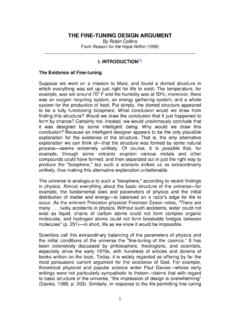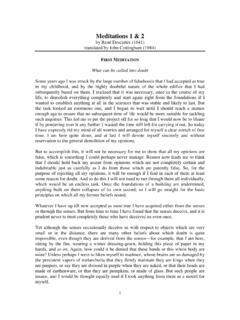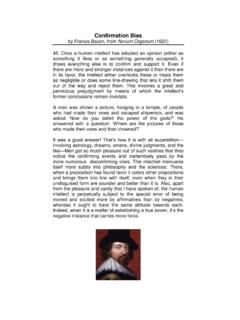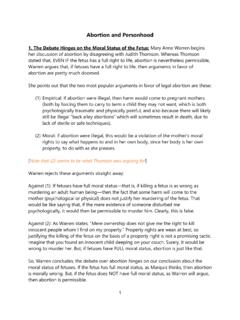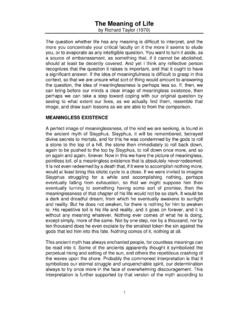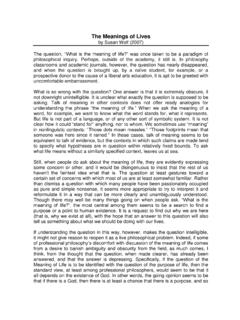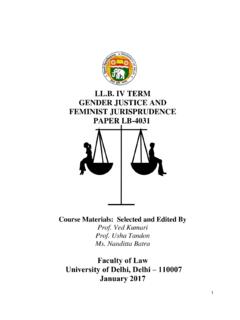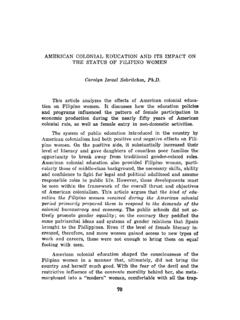Transcription of The Challenge of Cultural Relativism
1 1 The Challenge of Cultural Relativism by James Rachels morality differs in every society, and is a convenient term for socially approved habits. Ruth Benedict, Patterns of Culture (1934) How Different Cultures Have Different Moral Codes Darius, a king of ancient Persia, was intrigued by the variety of cultures he encountered in his travels. He had found, for example, that the Callatians (a tribe of Indians) customarily ate the bodies of their dead fathers. The Greeks, of course, did not do that the Greeks practiced cremation and regarded the funeral pyre as the natural and fitting way to dispose of the dead. Darius thought that a sophisticated understanding of the world must include an appreciation of such differences between cultures.
2 One day, to teach this lesson, he summoned some Greeks who happened to be present at his court and asked them what they would take to eat the bodies of their dead fathers. They were shocked, as Darius knew they would be, and replied that no amount of money could persuade them to do such a thing. Then Darius called in some Callatians, and while the Greeks listened asked them what they would take to burn their dead fathers bodies. The Callatians were horrified and told Darius not even to mention such a dreadful thing. This story, recounted by Herodotus in his History illustrates a recurring theme in the literature of social science: Different cultures have different moral codes. What is thought right within one group may be utterly abhorrent to the members of another group, and vice versa.
3 Should we eat the bodies of the dead or burn them? If you were a Greek, one answer would seem obviously correct; but if you were a Callatian, the opposite would seem equally certain. It is easy to give additional examples of the same kind. Consider the Eskimos. They are a remote and inaccessible people. Numbering only about 25,000, they live in small, isolated settlements scattered mostly along the northern fringes of North America and Greenland. Until the beginning of the 20th century, the outside world knew little about them. Then explorers began to bring back strange tales. Eskimos customs turned out to be very different from our own. The men often had more than one wife, and they would share their wives with guests, lending them for the night as a sign of hospitality.
4 Moreover, within a community, a dominant male might demand and get regular sexual access to other men s wives. The women , however, were free to break these arrangements simply by leaving their husbands and taking up with new partners free, that is, so long as their former husbands chose not to make trouble. All in all, the Eskimo practice was a volatile scheme that bore little resemblance to what we call marriage. 2 But it was not only their marriage and sexual practices that were different. The Eskimos also seemed to have less regard for human life. Infanticide, for example, was common. Knud Rasmussen, one of the most famous early explorers, reported that he met one woman who had borne 20 children but had killed 10 of them at birth.
5 Female babies, he found, were especially liable to be destroyed, and this was permitted simply at the parents discretion, with no social stigma attached to it. Old people also, when they became too feeble to contribute to the family, were left out in the snow to die. So there seemed to be, in this society, remarkably little respect for life. To the general public, these were disturbing revelations. Our own way of living seems so natural and right that for many of us it is hard to conceive of others living so differently. And when we do hear of such things, we tend immediately to categorize those other peoples as backward or primitive. But to anthropologists and sociologists, there was nothing particularly surprising about the Eskimos.
6 Since the time of Herodotus, enlightened observers have been accustomed to the idea that conceptions of right and wrong differ from culture to culture. If we assume that our ideas of right and wrong will be shared by all peoples as all times, we are merely naive. Cultural Relativism To many thinkers, this observation Different cultures have different moral codes has seemed to be the key to understanding morality . The idea of universal truth in ethics , they say, is a myth. The customs of different societies are all that exist. These customs cannot be said to be correct or incorrect, for that implies we have an independent standard of right and wrong by which they may be judged. But there is no such independent standard; every standard is culture-bound.
7 The great pioneering sociologist William Graham Sumner, writing in 1906, put the point like this: The right way is the way which the ancestors used and which has been handed down. The tradition is its own warrant. It is not held subject to verification by experience. The notion of right is in the folkways. It is not outside of them, of independent origin, and brought to test them. In the folkways, whatever is, is right. This is because they are traditional, and therefore contain in themselves the authority of the ancestral ghosts. When we come to the folkways we are at the end of our analysis. This line of thought has probably persuaded more people to be skeptical about ethics than any other single thing.
8 Cultural Relativism , as it has been called, challenges our ordinary belief in the objectivity and universality of moral truth. It says, in effect, that there is not such thing as universal truth in ethics ; there are only the various Cultural codes, and nothing more. Moreover, our own code has no special status; it is merely one among many. 3 As we shall see, this basic idea is really a compound of several different thoughts. It is important to separate the various elements of the theory because, on analysis, some parts turn out to be correct, while others seem to be mistaken. As a beginning, we may distinguish the following claims, all of which have been made by Cultural relativists: 1. Different societies have different moral codes.
9 2. There is no objective standard that can be used to judge one societal code better than another. 3. The moral code of our own society has no special status; it is merely one among many. 4. There is no universal truth in ethics ; that is, there are no moral truths that hold for all peoples at all times. 5. The moral code of a society determines what is right within that society; that is, if the moral code of a society says that a certain action is right, then that action is right, at least within that society. 6. It is mere arrogance for us to try to judge the conduct of other peoples. We should adopt an attitude of tolerance toward the practices of other cultures. Although it may seem that these six propositions go naturally together, they are independent of one another, in the sense that some of them might be false even if others are true.
10 In what follows, we will try to identify what is correct in Cultural Relativism , but we will also be concerned to expose what is mistaken about it. The Cultural Differences Argument Cultural Relativism is a theory about the nature of morality . At first blush it seems quite plausible. However, like all such theories, it may be evaluated by subjecting it to rational analysis; and when we analyze Cultural Relativism we find that it is not so plausible as it first appears to be. The first thing we need to notice is that at the heart of Cultural Relativism there is a certain form of argument. The strategy used by Cultural relativists is to argue from facts about the differences between Cultural outlooks to a conclusion about the status of morality .
